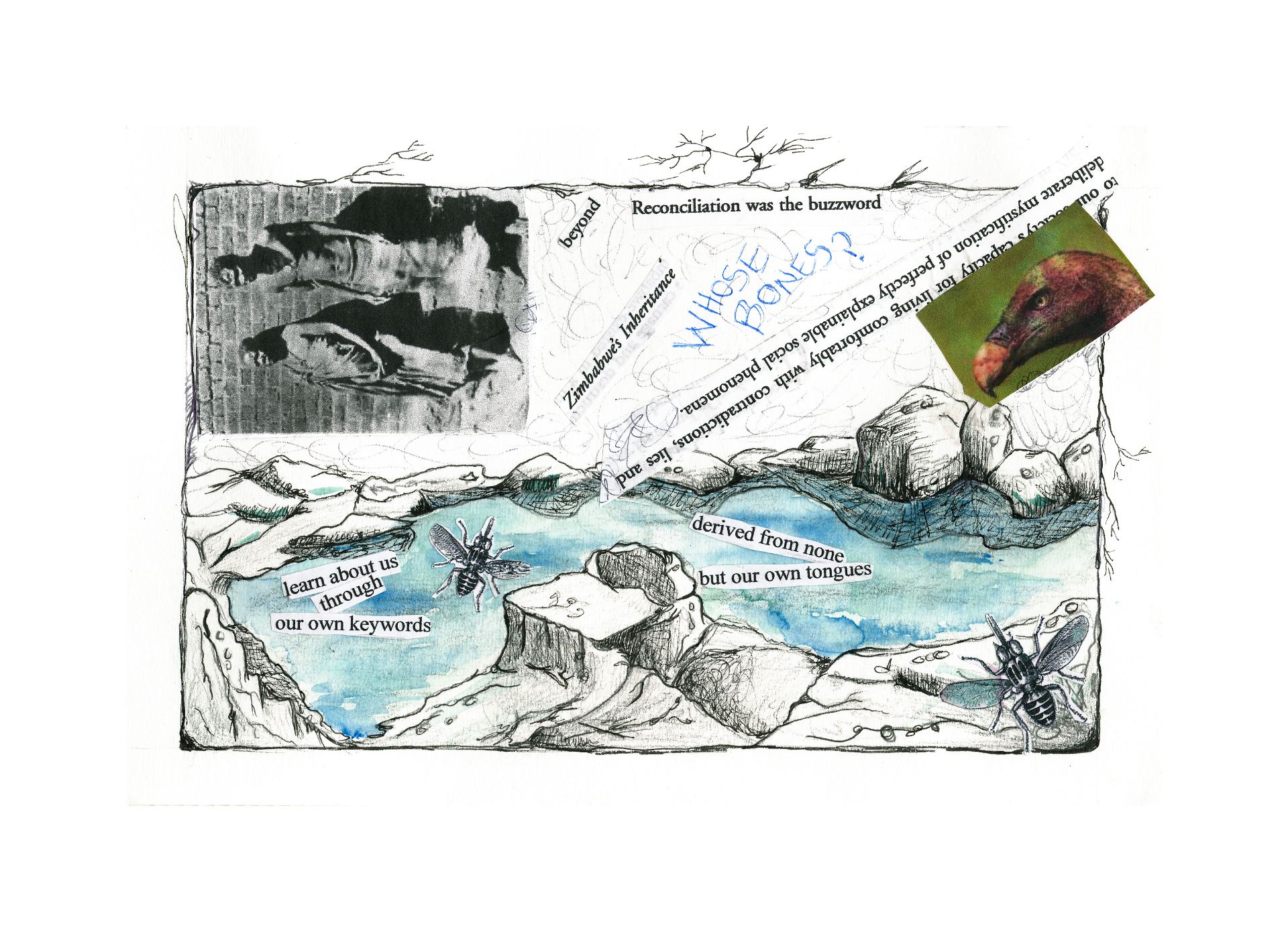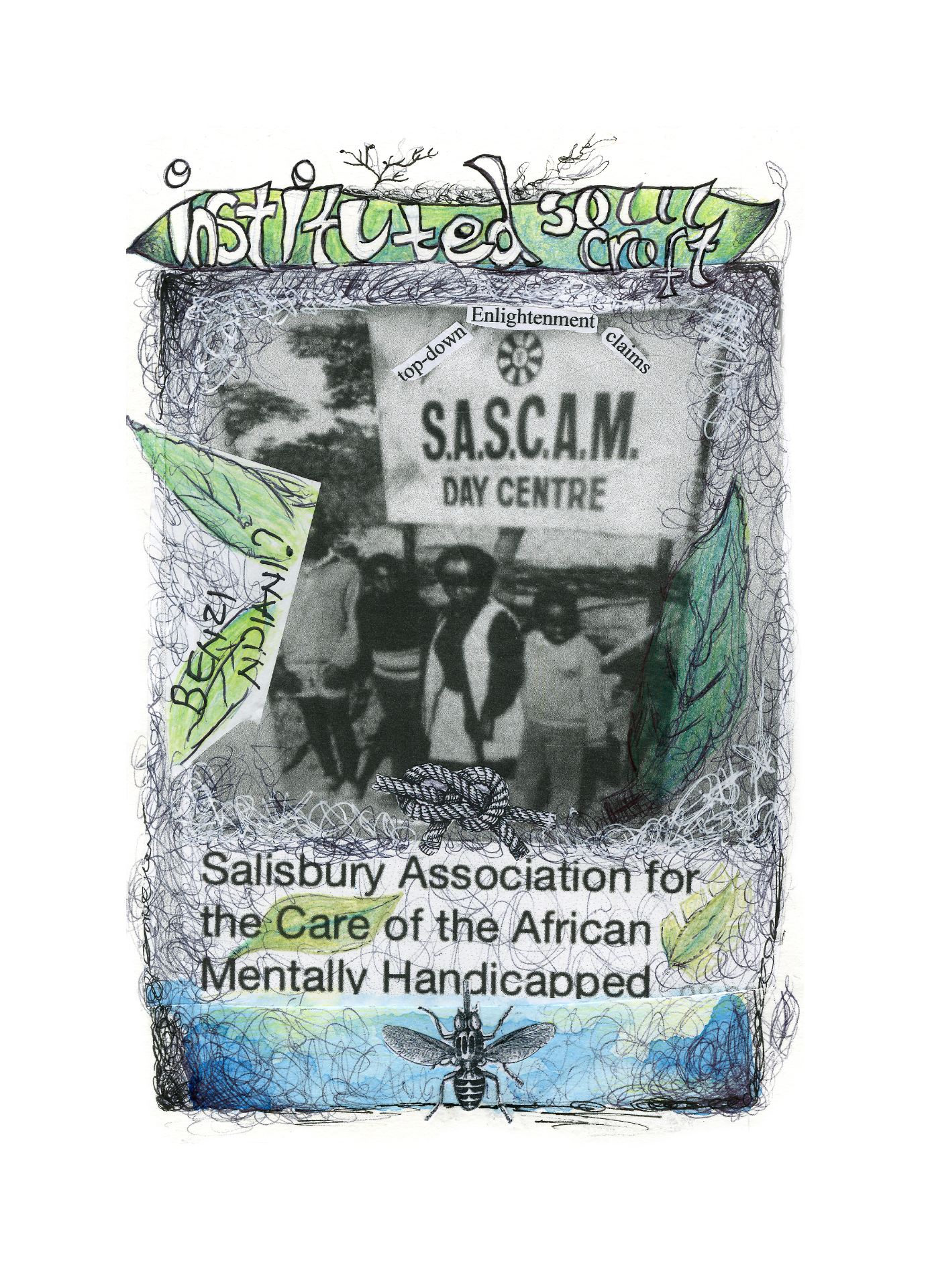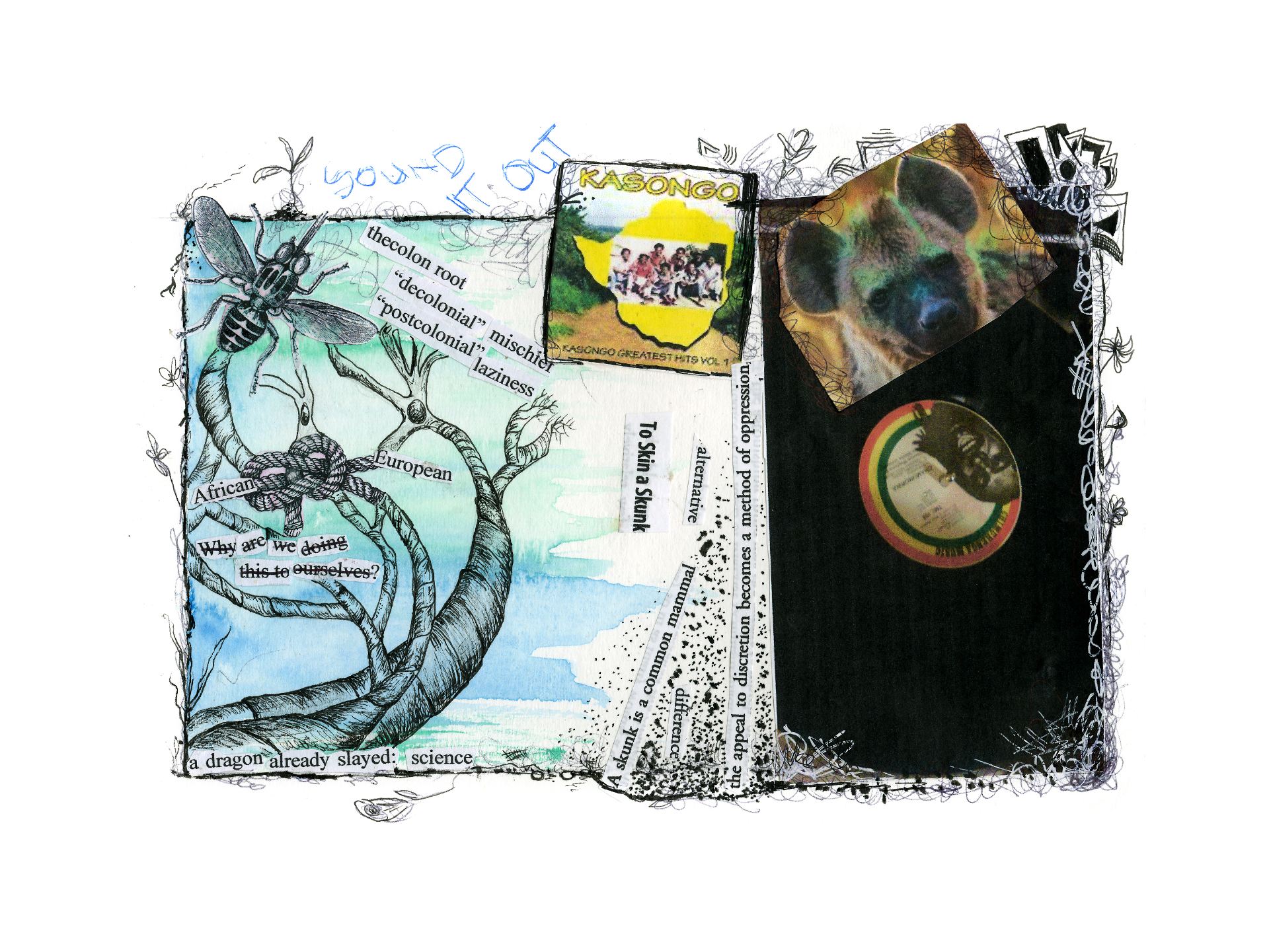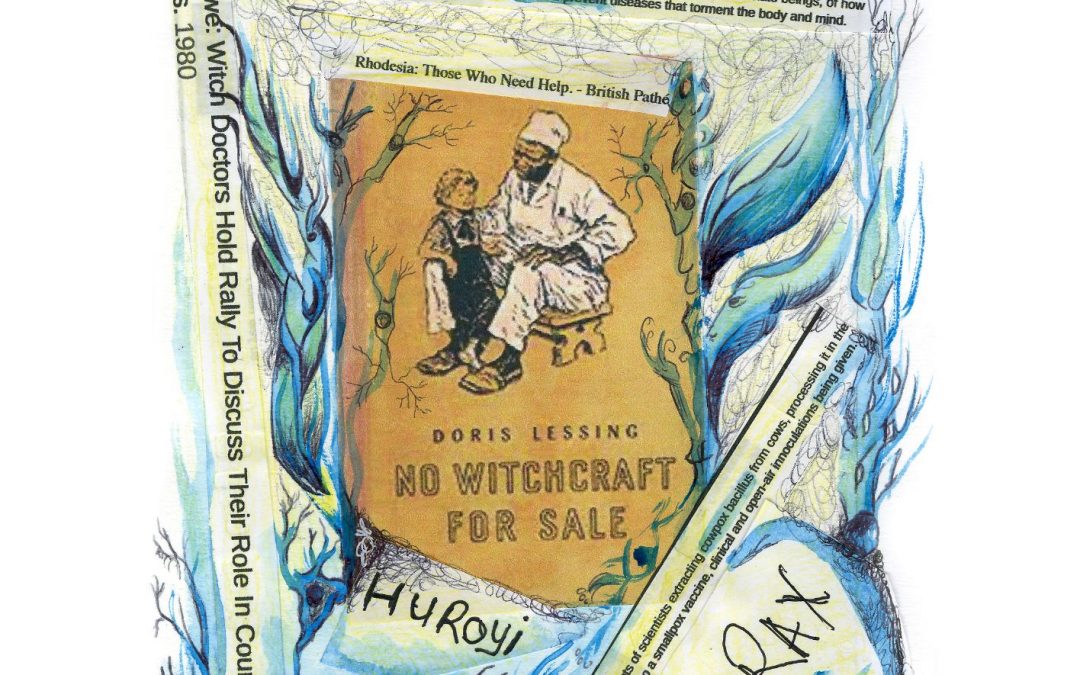Panel 1: Healing the Hand that Holds the Whip
All images: copyright Shelda-Jane Smith and Lennon Mhishi, 2021. Do not reproduce without permission.
Produced by Shelda-Jane Smith and Lennon Mhishi [1]
08-09-21: Marlene Smith reminded us to be restless. She was talking about art, but we took her to be talking about life – knowing, doing and being.
***
 Panel 2: RockPool
Panel 2: RockPool
Inspired by the surrealist game of Exquisite Corpse and the Exquisite Comics series produced by Liverpool-based arts collective Surrealerpool, we took two texts—the introductory chapter from Clapperton C. Mavhunga’s The Mobile Workshop: The Tsetse Fly and African Knowledge Production (2018) and Doris Lessing’s short story No Witchcraft for Sale (1951)—as our starting point.
Through a remix/mash-up of methods and practices (McKittrick, 2020) which are primarily collage, sketching, painting, music, poetry, prose and conversation, we explored knowledges from and of the Other. With a specific concern for knowledges of the body and psyche, we ended up with a 4-piece collage containing both of our distinct interpretations and responses to these texts comprising of juxtaposed images, shared and conflicting values, and biography.
That said, when practicing art as scholarship we find ourselves at a contradictory juncture. We do not present this as a tangible, coherent piece; rather, it is simply one way for us to overcome the stagnation (bounded) and repetitive (disciplined) practices of academic knowledge production. It is an attempt to take art and imagination as a legitimate aspect of scholarship. It contains our own uneasy feelings toward the academic-industrial complex and questions how to do ‘thinking work’ in places that subscribe to the hyper-technological and ableist demands of capitalism.
an agitation of sorts. it is our method of forging knowledges that value the inconsistent, dissonant, and contradictory realities of human life.
We are not about building canons, maxims or other burdens.
 Panel 3: Soulcraft
Panel 3: Soulcraft
Unresolved dialogue
“Sanity is….” We consider knowledge as intrinsic to the project of human liberation from oppression. As early career Black scholars, we walk forward in this industry with an epistemic commitment to life—one that foregrounds the ways of knowing and being from those who have been and continue to be Othered by dogmatic Western ideals of progress and development. Ours (for all) is a knowing that recognises incompleteness and fluid coherences. Not one of fixed categories or hierarchies.
“…. as opposed to…” To this point we considered the concept of Madness—or, any ‘undesired’ state of being that capitalist modernity has disowned/discredited/depreciated through efforts to control and cure. Whilst the amelioration of human and planetary suffering is of course worthy of all of our time and effort, are we always talking about the same suffering? Does the real Madness lie in the fervent yearning and devotion to order and eliminate the non-preferred—the queered, poor, Black, Indigenous, femme, disabled, diasporic—ways of being?
“Dispersed and unamenable to census taking.” What shall we make of the histories of power and control, and the subsequent technologies, mechanisms, practices and institutions that seek to order humanity and the physical and social environments? Genesis 1:28. Is it fair to say that Madness lies in obsessive attempts to delineate, order, rank and surveil the world despite the oppression and subjugation it causes? Is there a stopping point, a moment to breathe and reassess?
“Often there feels a need for a turn away from or return to…” Knowing ourselves on our own terms need not be found in the past (history) but in the here (geography) and now (the present moment) that we find ourselves. A ‘return to’, then, symbolises a hope that something lost can be regained, but then what…? ‘History’ still happened, the present still is and the future still awaits. It is in these uneasy yet proximate time/spaces that the possibilities of recuperation abound. No, there is no return to anything only re-collection and moving forward. From the ground we build the types of futures that we have always dreamed.

Panel 4: Knots and Sound Seeking
Liquid Worlds [2]
Sycorax. Knower, mother,
Exiled long before The Tempest arrived.
Ambuya. A little patch of land by the river, Zvirungurira, was her garden. Although she often discouraged it, she would relent and let me swim with other boys in the river. I was under strict instruction not to swim towards the deeper ends of the river, because the njuzu might take me, and if my parents cried, I would never be returned. The water, in a sense, was a border, a boundary, a liquid curtain, separating our world on the surface, and the other-world of the spirits deep beneath. The clarity of what was known met the opacity of the deep, a known unknown, as it were. Yet those who returned, it was said, became healers, bestowed with a special knowledge of being and of the world by the ancestors. This water, that nourished the little patch of garden, where we swam, kubhaguja, even more rewarding, but also sinister, than the bilharzia and whatever water parasites one might acquire, carried with it, beneath it, a whole other world. Thus was passed, in this, and many other such ways, warnings, and love, and the curiosity of what lies beneath the surface, beyond the gaze of the obvious, other worlds, the otherwise taken for granted.
This moment I return to collect comprises a counter-coven, a set of knowledges, traditions, experiences that function to refuse huroyi, the witchcraft of those other crossings, those other borders. There are, after all, not neat breaks, as departure consists not of some sort of cleansing, and even the water that washes seeps in, travels with the substance and content, and becomes, rather than ceases. It is also this epistemic universe, characterised by orality, animism and expansive relations in the human-animal-otherworldly, that partly anchors the dances with the institutional and disciplinary, in how Africa and its peoples continue to inhabit constructions of an oppositional force against the hypermodernities and hypercapitalisms of yonder. As if we can be fully known, and the forms of embodied intimacy rather than distance can be wholly encapsulated in these grammars of discipline and coloniality. Do we really want to be the-known in that sense?
Sycorax. Knower, mother,
Exiled long before The Tempest arrived.
[1] All parties contributed equitably to this entry. In the spirit of mutuality, lead authorship, must it be attributed, is equally shared, and interchangeable.
[2] This section is an extract from an unpublished, developing piece of work.
References
Lessing, D. (1951). No Witchcraft for Sale. In This Was the Old Chief’s Country. London: Michael Joseph.
Mavhunga, C., C. (2018) The Mobile Workshop: The Tsetse Fly and African Knowledge Production. Cambridge, MA: MIT Press.
McKittrick, K. (2020). Dear Science and Other Stories. Durham, NC: Duke University Press.
Smith, M. (2021, 8 September). Walking Tall [Lecture Presentation]. Black Health and Humanities Network.

